BASEBALL URBAN LEGEND: The Yankees accidentally left Tim Belcher unprotected in the 1984 Free Agent Compensation Draft.
Few Major League Baseball players have had as strange of a road to the Major Leagues as Tim Belcher did (Danny Goodwin is one of the few who could compare). Drafted number one overall in the 1983 amateur draft by the Minnesota Twins, the team had such major cash flow problems that they couldn’t afford to make a realistic offer to him. Belcher recalled to Eric Malinowski in 2014, ” I just felt like I was a victim of some circumstances that didn’t allow me to sign with the club. You know, that was a time when the Twins were at the end of the Calvin Griffith ownership period and they had no money. And not only did they not sign me, they didn’t sign Billy Swift, who was their No. 2 pick. He pitched in the big leagues a while. And Oddibe McDowell, who became an outfielder with the Rangers. They didn’t sign him, and we were three of their picks. They just didn’t have any money. So it was a little different situation than what you see currently.”
Belcher then went to go pitch for Team U.S.A. during the rest of 1983. According to the rules of the time, Belcher then became eligible for the supplemental amateur draft, which was in January of 1984. The Yankees selected Belcher with the number one pick of that draft.
However, a month later, Belcher was on the move again. There was a short-lived method of dealing with free agent compensation that allowed teams that lost “Type A” free agents to then essentially draft a player from any level (minors or Majors) of any other Major League team (besides 26 protected players on each team. In addition, if a team ceded the right to sign a Type A free agent, they could protect all of their players). ANY team, not just the team that signed their player. It was a system clearly designed to curtail free agency and it was a big part of the 1981 Player’s Strike. However, despite the strike, it still went into place in 1981. The Oakland Athletics lost Tom Underwood to then-reigning World Champion Baltimore Orioles and so the Athletics chose Belcher from the Yankees.
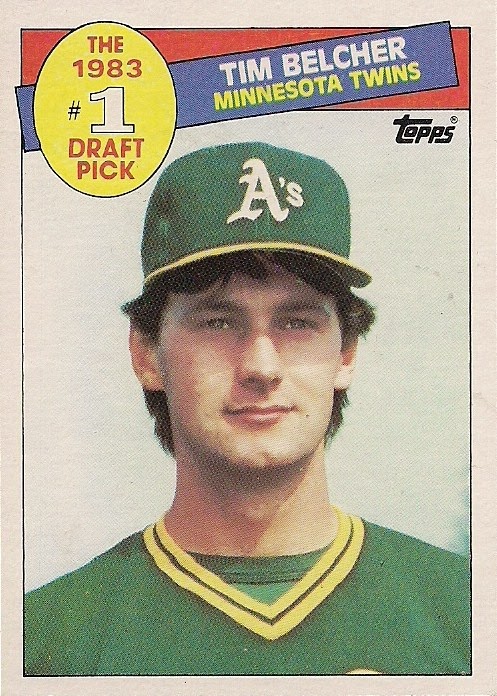
As the legend goes (from Baseball Reference’s Bullpen Wiki, as an example), “However, because of a front office mix-up, his name was left off the team’s protected players’ list for the free agent compensation draft and he was selected by the Oakland Athletics on February 8th. Yankees owner George Steinbrenner was livid over this development and blamed young general manager Murray Cook for it and fired him shortly afterwards.”
It is true that Steinbrenner was livid over the situation and he helped push for the elimination of the system after that year (the Mets also famously lost Tom Seaver to the Chicago White Sox in 1984, but that was just flat out incompetence by the Mets, who actively left Seaver off of their protected list, figuring no one would want to take an older player like Seaver. They were way wrong and it possibly cost them the division in 1985), but was it really a screw-up that Belcher was eligible to be taken?
Read the rest of this entry »
Tags: George Steinbrenner, Minnesota Twins, New York Yankees, Oakland Athletics, Tim Belcher
March 8th, 2019 | Posted in Baseball Legends | No Comments
BASEBALL URBAN LEGEND: A catcher once picked off a runner at third with the use of a potato!
One of the most legendary plays in the annals of baseball history is the so-called “Hidden Ball Trick.” It is when an infielder pretends to hand the baseball back to the pitcher but instead secretly holds on to the ball. Once the pitcher steps on to the rubber, the play is not allowed, so the pitcher has to really sell that he is getting ready to step on to the rubber without actually doing so. When the runner is convinced that the pitcher has the ball, he will typically take a small lead off of the base. Then the fielder (who secretly still has the ball) will tag the runner out. It used to happen a lot more frequently in the past, but you’ll still occasionally see it pop up. Mike Lowell, for instance, pulled it off on more than one occasion, during his career. However cool the hidden ball trick is, though, it does not compare to the variation on the play that Dave Bresnahan pulled off in 1987, where he used a potato to help pick off a runner at third base.
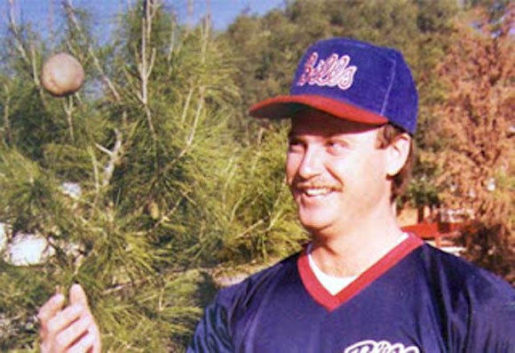
Read on to see how it happened!
Read the rest of this entry »
Tags: dave bresnahan, williamsport bills
March 8th, 2019 | Posted in Baseball Legends | No Comments
Here is the latest in a series of examinations into urban legends about football and whether they are true or false. Click here to view an archive of the football urban legends featured so far.
FOOTBALL URBAN LEGEND: The first professional football halftime show was designed as a way to sell dogs.
Today, halftime shows are a consistent part of any National Football League game with the Super Bowl halftime show routinely being the most lavish example of the year. However, in the early days of professional football, halftime shows were non-existent. The players would go into the locker rooms and that was it. Even in college football, halftime shows by the 1920s were a rarity. This changed with the introduction of a brand-new football team in 1922 that was designed all around one very important function…selling dogs.
Read on to learn more about the short-lived (but eventful) history of the Oorang Indians, the first professional football team to have a halftime show.
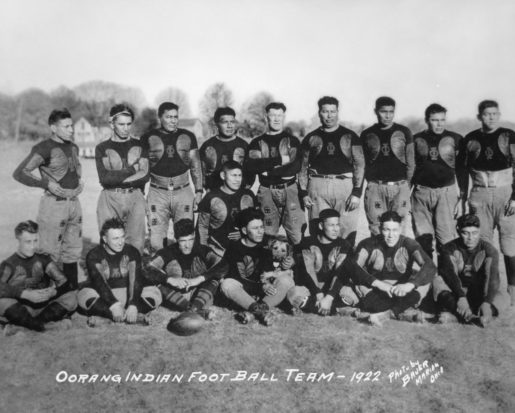
Read the rest of this entry »
Tags: Jim Thorpe, joe guyon, oorang indians, pete calac, walter lingo
January 7th, 2019 | Posted in Football Legends | No Comments
Here is the latest in a series of examinations into urban legends about basketball and whether they are true or false. Click here to view an archive of the basketball urban legends featured so far.
BASKETBALL URBAN LEGEND: Hall of Famer Kareem Abdul-Jabbar lost millions of dollars building specialized hotels for tall people.
In 2003, the rock band Pearl Jam released Lost Dogs, a compilation album consisting of notable B-Sides, unreleased songs and other rare material from the band over their then decade-plus career. One of the highlights of the album was the extensive liner notes where the band went into detail on each song on the album. Pearl Jam bassist Jeff Ament explained the history behind the unreleased song, “Sweet Lew,” one of the few Pearl Jam songs where Ament sang lead. As Ament explains it, he met Kareem Abdul-Jabbar in 1994 at a charity basketball game (Ament was on Abdul-Jabbar’s team) and while Ament was looking forward to meeting his boyhood idol, he was disappointed when he felt that Abdul-Jabbar essentially ignored him.
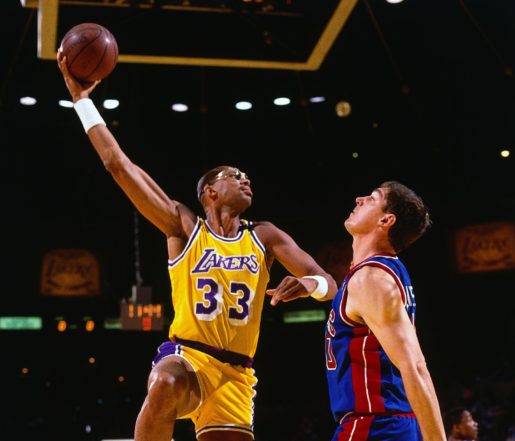
So Ament wrote “Sweet Lew” (referring to Abdul-Jabber’s name when he first joined the NBA, Lew Alcindor) including pointed references to the rumor that Abdul-Jabbar had lost millions building hotels for tall people:
build him high, build him tall
and later…
tear ’em down, one and all
7’2″ is a long way to fall
sweet lew, how’s the view?
sweet lew, how could you?
Is there any truth to this rumor? Read on to find out…
Read the rest of this entry »
Tags: "Sweet Lew", alex english, all-pro enterprises inc., Jeff Ament, kareem abdul-jabbar, Lew Alcindor, Los Angeles Lakers, Pearl Jam, ralph sampson, terry cummings, Thomas M. Collins
January 5th, 2019 | Posted in Basketball Legends | 1 Comment
Here is the latest in a series of examinations into urban legends about baseball and whether they are true or false. Click here to view an archive of the baseball urban legends featured so far.
BASEBALL URBAN LEGEND: A pitcher once was both the winning pitcher as well as the losing pitcher in a baseball game.
STATUS: True
Back in the 2009 season, Joel Hanrahan of the Pittsburgh Pirates received his first win of the season…in a game between the Washington Nationals and the Houston Astros! You can read this past edition of Baseball Urban Legends Revealed to get the specifics, but suffice it to say that it involved a suspended game and a trade. However strange Hanrahan’s situation was, though, Mexican League pitcher Mauro Ruiz did Hanrahan one better in 1963 when he somehow managed to be both the winning and the losing pitcher in a game! Read on to learn how this strange occurrence took place.
Read the rest of this entry »
Tags: Mauro Ruiz, Pericos de Puebla, Tigres del Mexico
June 9th, 2018 | Posted in Baseball Legends | No Comments
Here is the latest in a series of examinations into urban legends about baseball and whether they are true or false. Click here to view an archive of the baseball urban legends featured so far.
BASEBALL URBAN LEGEND: Rickey Henderson framed his first million dollar check without actually cashing it.
NOTE: This is a guest spot written by Kevin Kennedy, of the sports blog, USS Sports Machine.
Many researchers are still trying to distinguish whether or not Henderson cashed the first check that made him a millionaire. The original origin of the story had him receiving the check as part of his signing bonus after being drafted by the Oakland Athletics in 1976.
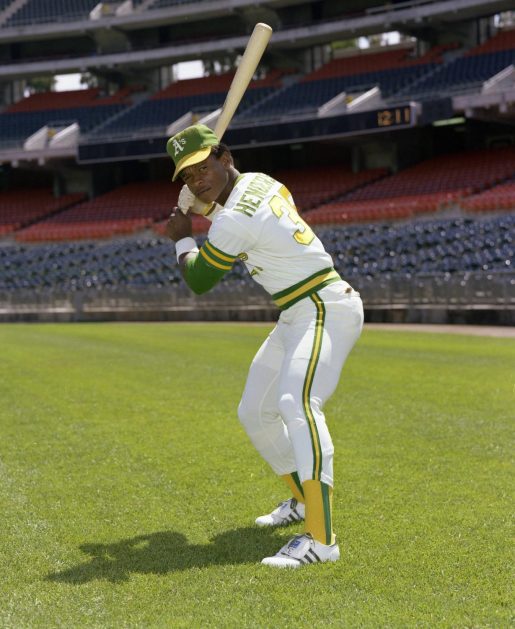
That story was proven to be false.
Another story that made the rounds of ballparks and press boxes was the New York Yankees was the team that gave Henderson a million dollar bonus check.
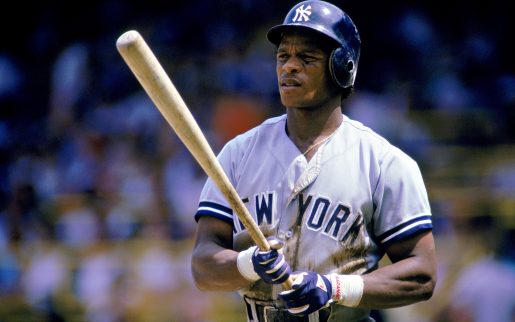
After an inquiry from the team’s finance department, the Yankees decided to send current team president Brian Cashman, who was an intern at the time, to investigate why the check wasn’t cashed. Cashman called Rickey to see if he ever received the check from the team, Henderson replied that he framed the check until the money market rates went up in price. This story is partially true, but with a different team and young team executive that sought out to find the truth of the mystery.
Read the rest of this entry »
Tags: Brian Cashman, New York Yankees, Oakland Athletics, Rickey Henderson
January 2nd, 2017 | Posted in Baseball Legends | 2 Comments
Here is the latest in a series of examinations into urban legends about baseball and whether they are true or false. Click here to view an archive of the baseball urban legends featured so far.
BASEBALL URBAN LEGEND: A convict signed a contract to play professional baseball…while still in prison!
For at least a century (and very possibly longer than that), a very popular sport within prisons in the United States has been organized baseball. One of the biggest problems within prisons is finding things for the prisoners to do, and organized sports do a very good job at filling in those open hours in the lives of the inmates. In San Quentin Stat Prison in California, one of the largest prisons in the United States, they have been playing organized baseball since 1920 and are one of the few prisons that actually allows its prison baseball team to travel outside of the jail to play away games. As successful as having a baseball program is with most prisons, it was especially successful for one prisoner at Oregon State Penitentiary who actually signed a deal to be a professional baseball player while still a convict at Oregon State Penitentiary in 1942. Read on to learn Keith Crosswhite’s tale.
Read the rest of this entry »
Tags: Big Luke Crosswhite, Keith Crosswhite, Salem Senators, W.G. Bramham
November 4th, 2016 | Posted in Baseball Legends | No Comments
Here is the latest in a series of examinations into urban legends about basketball and whether they are true or false. Click here to view an archive of the basketball urban legends featured so far.
BASKETBALL URBAN LEGEND: Legendary UCLA basketball coach John Wooden once said a notable impassioned quote about the importance of land to Americans.
Besides being a legendary basketball coach, the late, great John Wooden (winner of ten national championships as the head coach of UCLA, plus one championship as a player for Purdue in the 1930s) was also quite an inspirational writer and speaker. He wrote (or co-wrote) over a half dozen books and was an in demand motivational speaker until his death in 2010. He was a proponent of what he called the Pyramid of Success, which consisted of philosophical building blocks for winning at basketball and at life. Some of the famous maxims that Wooden coined over the years include, “Failing to prepare is preparing to fail” and “Flexibility is the key to stability.”
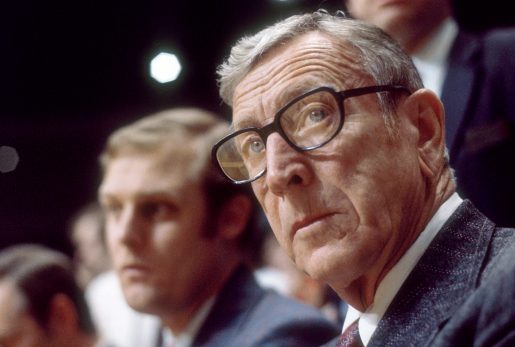
In her 2009 memoir, Going Rogue, former Republican Vice-Presidential nominee Sarah Palin spoke about a time that Coach Wooden’s words helped her through a disappointing moment in her life. Palin, who was a star basketball player during high school (leading her team to an Alaskan National Championship in 1982), has been a sports fan her whole life and even once dreamed of being a sportscaster for ESPN (which is at least partially the reason her daughter’s name is Bristol) so it comes as no surprise that she would find comfort in the words of Coach Wooden. In 2002, following his election a Governor of Alaksa, Alaskan Senator Frank Murkowski had to choose his successor in the United States Senate. He put together a list of candidates, including Palin. He interviewed her, but after the interview was over she had the impression that he was not going to be appointing her. On the drive home, she discussed her disappointment with her husband, Todd.
We were disappointed…for about seven seconds. We talked about the way the “ball bounces.” We reminded each other how UCLA Coach John Wooden had captured our thoughts in a book we’d read about him. I told Todd, “Coach Wooden said, ‘Things work out best for the people who make the best of the way things turn out.'” We said in unison, “Or something like that!”
Later on in the book, Palin continued to show her appreciation for Wooden’s words by making a Wooden quote the epigram for the chapter about her decision to run for Governor of Alaska against Murkowski. The quote reads:
Out land is everything…I will tell you one of the things we remember on our land. We remember that our grandfathers paid for it – with their lives.
It’s a powerful quote. But did Wooden actually say it?
Read the rest of this entry »
Tags: John Wooden, John Wooedenlegs, Sarah Palin
November 4th, 2016 | Posted in Basketball Legends | 1 Comment
Here is the latest in a series of examinations into urban legends about baseball and whether they are true or false. Click here to view an archive of the baseball urban legends featured so far.
BASEBALL URBAN LEGEND: Maury Wills was such a longshot to make it in the Major Leagues that Topps turned down the opportunity to sign him to a $5 baseball card contract.
Maury Wills is a true Los Angeles Dodgers legend. The Dodgers won their first championship in Los Angeles in Wills’ first season and went on to win two more titles during his first tenure with the team (1959-1966), with Wills being the team captain from 1963-1966. Wills made the All Star Game in five separate seasons and received the very first All Star Game Most Valuable Player Award ever in 1962! That same season, Wills beat out Willie Mays to win the National League Most Valuable Player Award.
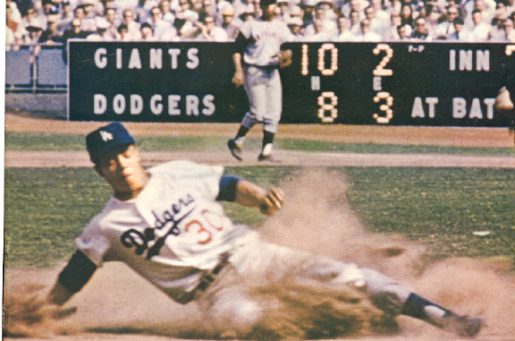
In 1962, Wills also won his second Gold Glove at shortstop and set a new Modern Era (post-1900) Major League record for the most stolen bases in a single season with 104 (the first player ever to steal over 100 bases in the Modern Era). Wills’ revival of the stolen base is probably his greatest legacy. Before he stole 50 bases in 1960, no National Leaguer had stolen 50 bases since 1923! However, while Wills was setting records and showing up on Most Valuable Player ballots there was one place he was conspicuously absent – packs of Topps baseball cards! Wills did not have a Topps baseball card until 1968, nearly a decade into his Major League career! For a card company that prided itself on having basically every Major Leaguer in the game, Wills was a notable exception. What makes it even more notable is why Topps did not have a Maury Wills card. You see, Topps did not feel Wills was worth paying the $5 it would have taken to sign to a baseball card contract!
Read on to see how such a strange occurrence could have taken place!
Read the rest of this entry »
Tags: Los Angeles Dodgers, Maury Wills, Most Valuable Player Award, Pittsburgh Pirates, Topps
October 21st, 2016 | Posted in Baseball Legends | No Comments
Here is the latest in a series of examinations into urban legends about basketball and whether they are true or false. Click here to view an archive of the basketball urban legends featured so far.
BASKETBALL LEGEND: A missed free throw by an Austin Peay player in 1987 changed the direction of the New York Knicks for the next fifteen years.
Clearly, the history of basketball is filled with seemingly minor decisions that had ripples that affected players and coaches throughout the league. One of the most famous would be “What if the Portland Trailblazers had drafted Michael Jordan with the #2 pick in the 1984 NBA Draft?” But just as clearly, there are smaller examples that might not have the same glorification of the Blazers passing on Jordan or the Detroit Pistons passing on Carmelo Anthony, Chris Bosh and Dwayne Wade in the 2004 NBA Draft, but they still change a team’s destiny.
This brings us to Bob Thomas, and how his missed free throw in 1987 affected the Knicks franchise for the next fifteen years or so.
Read the rest of this entry »
Tags: Austin Peay, Bob Thomas, Hubie Brown, Jeff Van Gundy, Larry Brown, Mike Lupica, New York Knicks, Providence, Rick Pitino, Stu Jackson, William Goldman
October 14th, 2016 | Posted in Basketball Legends | 2 Comments













